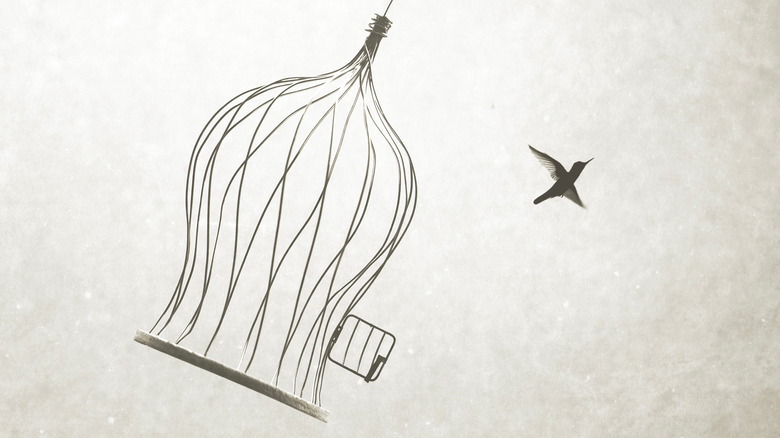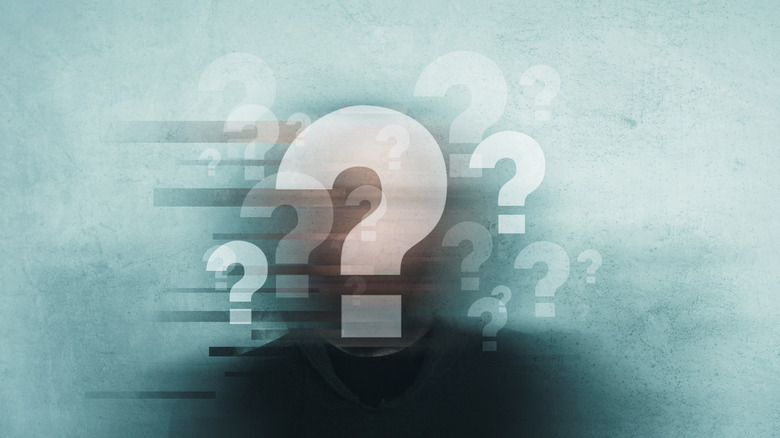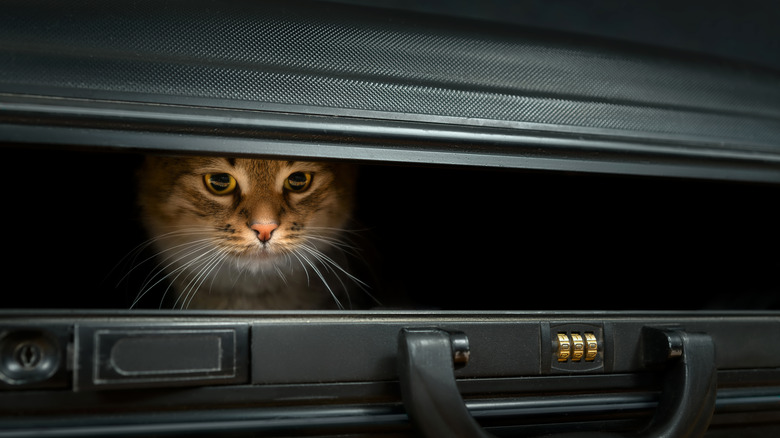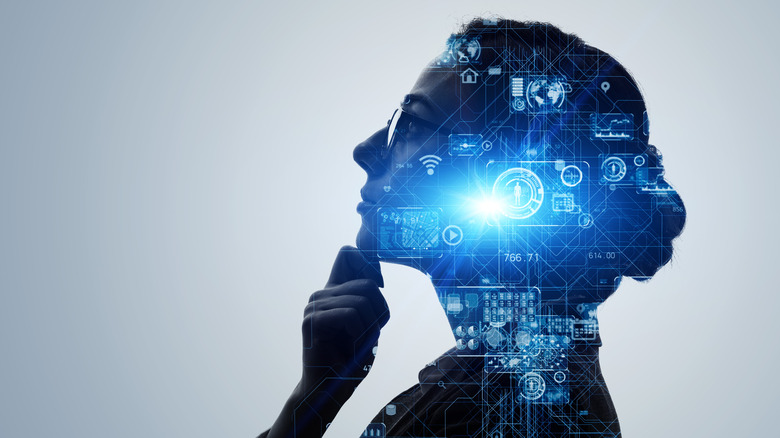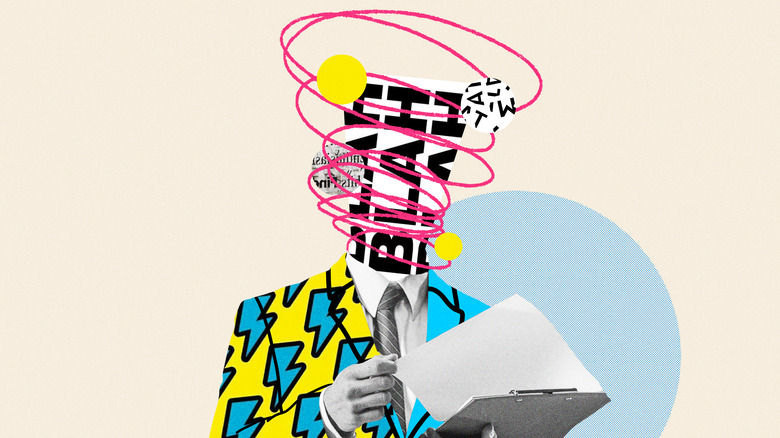The Controversial Theory That Suggests Free Will May Not Exist
Lots of folks might get miffed at the notion that they're mere biological automatons driven by cellular biology, neurochemistry, and cognitive algorithms derived from genetics and upbringing. After all, what is life except a thing to be lived according to one's own rules, drives, and passions? So we're told in story after movie after film after song, by exemplars and proxies for wish fulfillment. All the while, most folks make conscious choices based on narrow sets of parameters: circles of friends, available job offerings, potential cell phone case color purchases, things like that. Sure, people could drop everything in their mid-20s one day and say, "Forget this noise, I'm moving to the Bahamas!" But how many people actually do? The one person out of a million is exceptional for a reason.
The notion that folks lack "free will" is muddied by two things: the definition of "free will," and what we mean by "choices." Of course, if someone gets hungry in the mid-afternoon and says, "Man, I really need a snack," and then goes to get some Funyuns from a vending machine, that's a decision ostensibly made by the conscious mind. But what led this fictional person, in that moment, to sit back and pause for a second, stare at the ceiling, and say, "BAM. Funyuns. Got it." There are a host of underlying factors leading from that simple decision, all the way to life-changing ones, that may actually be completely deterministic.
The quest for a 'soul'
There's a lot of ways to approach the question of what's dubbed "free will," but we're going to start with a tried-and-true question: Do people have "souls"? As in: immaterial, noncorporeal, spirit-like things both independent of physical forms, but somehow tethered to a living body, and persistent beyond death. Plenty of people will have religious opinions about this question that we will not address here.
Beyond theology and orthodoxy this question highlights a simpler root question: Is everything that exists physical? A physicist looks at a table and sees a bunch of energy, largely empty space, composed of protons, neutrons, electrons, and so forth. That's its true form — what it is when reduced to its smallest parts. The universe is composed of only such things, and the universe is what contains everything that exists. This is what's called a "materialist" view of reality. If we can't see it, touch it, know it through instruments, then it's unverifiable and does not exist. As some would say, like souls.
English philosopher Thomas Hobbes (1588-1679) came from this school of thought, although he predates modern physics. As Dr. Michael LaBossiere's blog excellently summarizes, Hobbes would say that the "mind" is the physical brain, and nothing more. There is no ghost in the machine. He would agree with physicists that the mind is sparks of electrons traveling along circuits and carrying out predictable functions. This kind of physical system adheres to laws that are 100% knowable and deterministic. Hence: no free will.
Schrödinger's cat is out of the bag
So the universe is composed of deterministic rules that allow everything to be predictable, given enough information. One particle moves, nudges the one next to it, and so on. And where does it end? It's just a matter of crunching numbers. The brain is also just a bunch of particles that nudge, and in the end can be predicted. As The Guardian says, if there was an ultra-powerful entity who knew the position of every particle in the universe, it could predict everything and essentially be omniscient. That is, before we introduce quantum mechanics — to a point.
Let's do a quick debrief using the "Schrödinger's cat" thought experiment: If a cat is in a box before you open the box, is it dead or alive? "Yes" is the answer. That sums up the fundamentals of quantum physics pretty well: Every sub-atomic particle has an "entangled," spooky, virtual quantum twin with properties that are unable to be known until it's measured. These particles can also exist non-locally, per Scientific American, which means that they don't even have to be nearby. Does such unpredictability free up the possibility of free will?
The answer is "no, not really." In his 2015 book "The Cellular Automaton Interpretation of Quantum Mechanics," Nobel laureate Gerard 't Hooft purports the existence of "superdeterminism": underlying principles that govern the seemingly random nature of quantum mechanics. In other words, even what seems random is predictable if we know its rules.
Choose it for me, algorithm
Astute readers might be thinking at this point, "Just because something knows what I'll do doesn't mean I didn't choose it." And to this, we say: algorithm.
Ever since the Renaissance, Western civilization has been building toward its individual-knows-best, live-life-your-own-way credo. Barring religious teachings and texts that many still use as moral guidebooks in an ever-changing world, the entirety of modernity is built on the scientific method, empiricism, and the assertion of individual choice. Free market capitalism, liberal democratic values, the human rights movement: All of these hinge on the notion that people have an innate right to decide their own destiny.
Yet, now neuroscience and computer science are reaching a different conclusion: choices (do I want a new skirt or shirt?), personalities (am I reserved or outgoing?), and innate characteristics (am I gay or straight?) are either predetermined or predictable. Otherwise, we wouldn't be able to develop drugs for mental health disorders, suggest ads to people based on viewing preferences, or develop DNA profiles that provide everything from diet to partner recommendations.
What if we get to the point where someone wakes up in the morning (as Israeli professor Yuval Noah Harari says in his 2018 book "21 Lessons for the 21st Century," and summarized in The Guardian), and your personal AI assistant predicts that in nine months you'll be miserable if you start dating Tommy tomorrow because he'll cheat on you? Would you pursue the relationship?
The neuroscientific nail in the coffin?
Now we go back to our original "What mid-afternoon snack do I want?" question, and then choosing Funyuns from a vending machine. What led to that choice, neurologically? It didn't spawn from nothing. When Sigmund Freud talked about "the unconscious mind," he did a pretty good job of predicting the neurological iceberg underneath our conscious awareness. Motivations, drives, calculations, decision-making: All these processes occur under the hood. At the moment you think "I want those Funyuns," it's because the unconscious, i.e., cognitive algorithms, have reached that conclusion and pushed it to your conscious awareness. Bigger decisions feel more psychologically strenuous because the factors are more complex.
Philosophy Break cites a number of studies that might put the nail in the free will coffin. A 2011 study, "Decoding and Predicting Intentions," for example, available on the National Library of Medicine, reports being able to measure people's actions before they took them. In this study, participants were asked to press one of two buttons while watching randomized images on a screen. Functional magnetic resonance imaging (fMRI) brain scans were able to predict what buttons people would press not 300 milliseconds ahead of time like an earlier study, but a full seven to 10 seconds. Another study reported being able to tell what choices a person would make, to within 80% accuracy, measuring only 256 neurons. In other words, conscious decisions are the final, delivered result of unconscious, neurological process.
The relevance of free will
All these facts can be quite distasteful for people who've grown up in a civilization where the entire cultural ecosystem tells you things like "you're your own person," "you can be anything you want," "no one can tell you who you are," and so on. Plenty of people will believe such statements even as real, factual data piles up to the contrary.
It's understandable. Folks shield themselves in half-truths and assumptions practically every minute of the day: "I'll persist beyond death," "I'll get paid on time," "My car will be in the driveway tomorrow," and so on. Folks love believing they're in control of themselves and their lives, and get pretty disheartened when considering otherwise. In fact, as The Conversation says, even reading an article like this one about the lack of free will diminishes people's confidence in the concept. Some people of religious faith are bound to strongly disagree with the mere suggestion that they can't choose (or reject) what is right.
But perhaps the question is: Does it matter? And we don't mean life — we mean the notion of free will. Each individual is still completely unique, given DNA and environmental factors, and the choices you make still arise from your own consciousness. Until some evil AI overlord actually enslaves you and controls your body, you can still choose from as many pre-selected options as you'd like.
